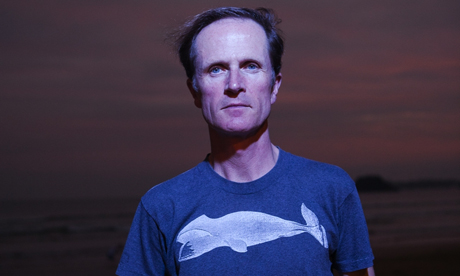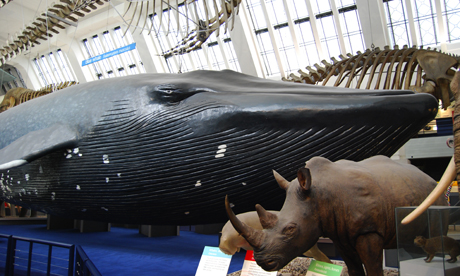The Sea Inside: Philip Hoare talks whales and Loch Ness monsters ahead of Hackney book launch

Author Philip Hoare will launch his new book in Hackney next month. Photograph: Andrew Sutton
Philip Hoare began his writing career in Hackney – writing for the music press in the post-punk explosion – before authoring his first book about an aristocratic aesthete, the Hon. Stephen Tennant.
His other works have included Wilde’s Last Stand, about Oscar Wilde and decadence during the Great War, and Spike Island: The Memory of a Military Hospital.
But Hoare has also had a lifelong obsession with the sea and its greatest creatures, and says he used to dream that whales and sharks swam in circles around the feet of the block in Hoxton where he lived.
This fascination culminated in Leviathan, a paean to the sperm whale and meditation on Moby-Dick, which won the 2009 Samuel Johnson prize for non-fiction.
Next month Hoare will return to Hackney to speak at the Stoke Newington Literary Festival and launch The Sea Inside, his follow-up to Leviathan, at The Last Tuesday Society.
He says the book, described as part memoir, part travelogue, “lurches from island to island in search of the myths and realities caught in the tectonic meeting of human and natural history”.
Hoare recently launched Moby-Dick Big Read, an online project featuring readers including David Cameron and Tilda Swinton reading chapters from Melville’s masterpiece.
He caught up with the Hackney Citizen ahead of his engagements in the borough next month.
Josh Loeb: Leviathan was clearly born out of a deeply personal passion and was something of a departure from your previous books. Was it hard to convince people in the literary world that there would be enough of an audience for the book, or were your publishers all ears from the start?
Philip Hoare: My publishers are enormously forbearing and foresighted people with immaculate taste. From Wilde to whales was evidently – or at least apparently – a giant leap. But I think anyone reading my books could detect a certain lineage; traces of one affects the other. If I can convey my passion – which I believe many people share (witness the 2.5 million hits on the Moby-Dick Big Read site) – then perhaps I’m just a conduit, between one vast and illimitable subject, and those who feel they commune with it, in one way or another.
JL: What, if any, relationship does the average hipster or hoodie-wearing resident of an inner city area like ours have with the sea, and why should we care about it?
PH: Well, apart from the fact that they’ll fall down dead, gasping for oxygen, without the sea; or that they’ll starve to death; or that almost everything they operate or own comes to them via the sea; apart from all that, no-one’s soul is untouched by the ocean, by its abiding wildness, the skin that stretches over its surface and links every civilisation and time-zone, every politic and culture; the very transmission of ideas and life itself. It is the world wide web out of which we were born.
JL: For those unable to take the train to Southend or further afield, what’s best for a taste of the sea and its wonders? A visit to the London Aquarium? Or is there somewhere more thoughtful you could suggest?
PH: Well, the Whale Hall of the Natural History Museum is a good place to start. Linger under the belly of the whale and imagine yourself encased in its blubber. Go soon, because, horror of horrors, the Museum intends to dismantle the place soon. Or dally, like the near-suicidal Ishmael, on the banks of the Thames at Deptford where Peter the Great came to learn ship-building, where Melville himself wandered daydreaming of Moby Dick; think of the whaling rendering factory whose foundations lie under the O2; and imagine how many cetaceans have found themselves up this dead-end. The Sea Inside has an entire chapter devoted to this subject, and that of John Hunter, the 18th century surgeon and Londoner obsessed with whales; I highly recommend his collection of whales’ guts in the Royal College of Surgeons at Lincoln’s Inn Fields. I also like swimming in the Serpentine among the goose shit and imagining myself to be in New England.

The Natural History Museum's 'Whale Hall'
JL: You recently wrote an article for The Guardian about how cryptozoological YouTube hoaxes have killed the Loch Ness Monster. Hackney is not bordered by the sea, but we do have the River Lea with its very own “Nessie” (the large, aquatic goose-eating creature documented in the Hackney Citizen in 2011).
PH: Ha! There are monsters everywhere. Did you know that the mechanism for retrieving biopsy samples from whales was developed from the dart invented by Roy Mackal to harpoon the Loch Ness monster? Science and fiction blur in such stories. That’s what my book is about.
JL: I noticed that the cover of your new book has a picture of a thylacine on it – a very evocative extinct species, but what has it to do with the sea?
PH: I suppose I could say that the thylacine reminded me of Pakicetus, the dog-like evolutionary ancestor of the whales. But really, going to Tasmania was just an excuse to write about another animal that fascinates me. The Sea Inside declines to be confined by its title.
JL: You had some pretty big names involved in reading sections of Melville’s masterpiece for your Moby-Dick Big Read project. Was it hard to get the likes of the Prime Minister on board?
PH: Well, yes, because every chapter we chose for him was proscribed by Downing Street – mentions of Islam or hunting were no-go areas. Even the chapter he did read, ‘The Pipe’, could have been seen to be promoting smoking, if not for the fact that at the end of the chapter, Captain Ahab tosses his pipe overboard.
Curating, with Angela Cockayne, 136 readers and 136 artists for the project, over a two-year period, was something of a leviathanic challenge. From Tilda Swinton and Stephen Fry to John Waters and Fiona Shaw. But also schoolchildren, sailors, and a vicar, were involved. We’re hoping to release the whole thing as an e-book – soon. Did you know Orson Welles staged his dramatisation of Moby-Dick at the Hackney Empire? Iain Sinclair was once offered film footage of this lost and legendary masterpiece. The great White Whale in E8? Surely not…
Philip Hoare will appear at the Stoke Newington Literary Festival on June 8 and will be launching The Sea Inside at The Last Tuesday Society in Mare Street on 19 June.
